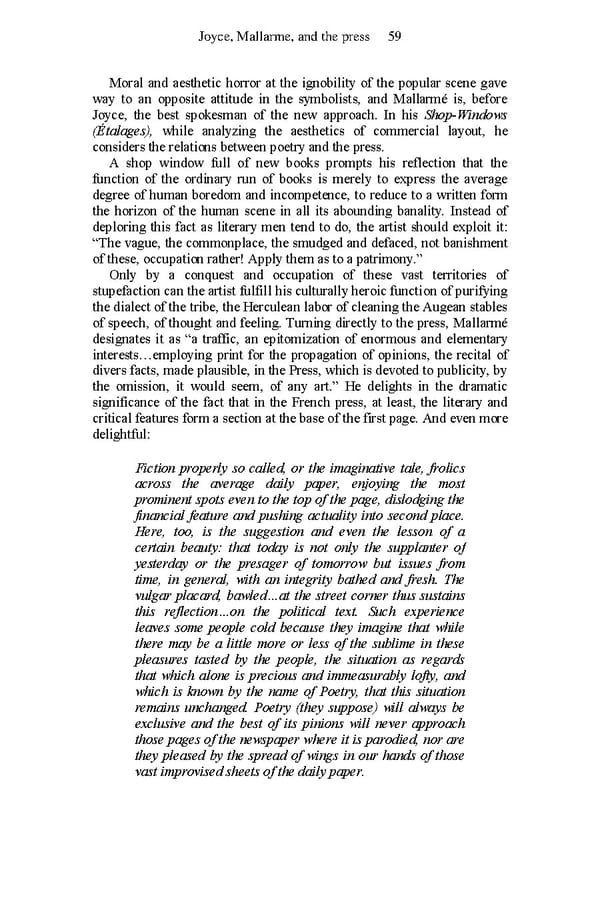Joyce, Mallarme, and the press 59 Moral and aesthetic horror at the ignobility of the popular scene gave way to an opposite attitude in the symbolists, and Mallarmé is, before Joyce, the best spokesman of the new approach. In his Shop-Windows (Étalages), while analyzing the aesthetics of commercial layout, he considers the relations between poetry and the press. A shop window full of new books prompts his reflection that the function of the ordinary run of books is merely to express the average degree of human boredom and incompetence, to reduce to a written form the horizon of the human scene in all its abounding banality. Instead of deploring this fact as literary men tend to do, the artist should exploit it: “The vague, the commonplace, the smudged and defaced, not banishment of these, occupation rather! Apply them as to a patrimony.” Only by a conquest and occupation of these vast territories of stupefaction can the artist fulfill his culturally heroic function of purifying the dialect of the tribe, the Herculean labor of cleaning the Augean stables of speech, of thought and feeling. Turning directly to the press, Mallarmé designates it as “a traffic, an epitomization of enormous and elementary interests…employing print for the propagation of opinions, the recital of divers facts, made plausible, in the Press, which is devoted to publicity, by the omission, it would seem, of any art.” He delights in the dramatic significance of the fact that in the French press, at least, the literary and critical features form a section at the base of the first page. And even more delightful: Fiction properly so called, or the imaginative tale, frolics across the average daily paper, enjoying the most prominent spots even to the top of the page, dislodging the financial feature and pushing actuality into second place. Here, too, is the suggestion and even the lesson of a certain beauty: that today is not only the supplanter of yesterday or the presager of tomorrow but issues from time, in general, with an integrity bathed and fresh. The vulgar placard, bawled…at the street corner thus sustains this reflection…on the political text. Such experience leaves some people cold because they imagine that while there may be a little more or less of the sublime in these pleasures tasted by the people, the situation as regards that which alone is precious and immeasurably lofty, and which is known by the name of Poetry, that this situation remains unchanged. Poetry (they suppose) will always be exclusive and the best of its pinions will never approach those pages of the newspaper where it is parodied, nor are they pleased by the spread of wings in our hands of those vast improvised sheets of the daily paper.
 Essential McLuhan Page 65 Page 67
Essential McLuhan Page 65 Page 67